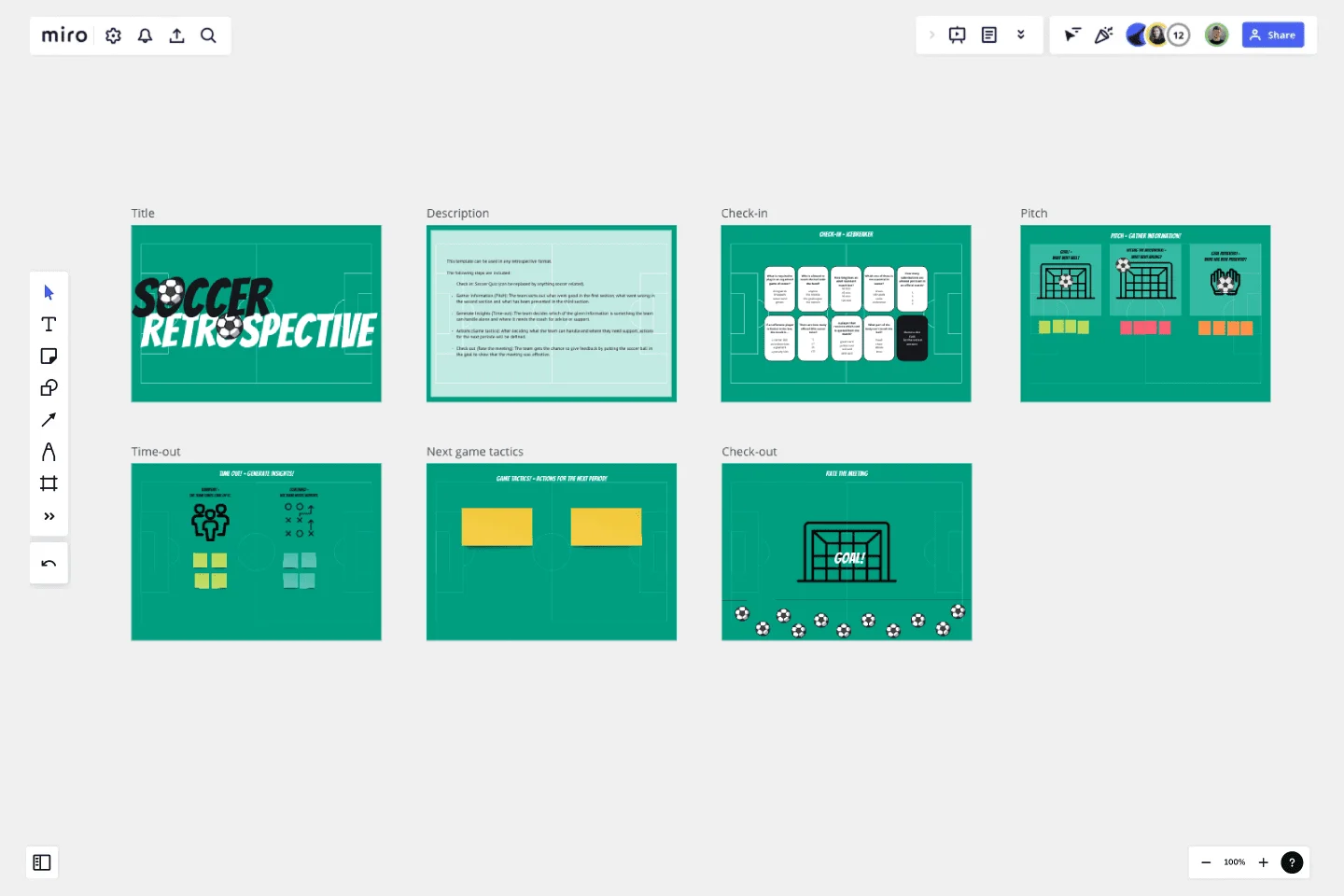Soccer Retrospective
This is a 60-90 minute retrospective inspired by soccer.
The goal of this retrospective is to help team members look back at a Sprint, project or a periode in general and evaluate what went well, what went not well and what was prevented.
How to use this template
This template can be used in a team from 2 to 9 people or even bigger teams. Just copy or remove icons to fit it to your team size.
Check-in: Just start with a check in of your choice or use the soccer quiz.
Gather information: With the three spaces for what went well, what went not well and what was pevented.
Generate insights: With the two spaces to decide what the team can handle alone without support and where the team needs support or advice from the coach.
Actions: Decide which actions are needed for the next periode.
Check-out: Let the team decide if the meeting has scored a goal.
This template was created by Daniel Fischer.
Get started with this template right now.
A Halloween Retro
Works best for:
Retrospectives, Meetings, Agile Methodology
The Retrospective Halloween template offers a themed approach to retrospectives, perfect for the spooky season. It provides elements for reflecting on past iterations, identifying scary issues, and brainstorming solutions. This template enables teams to have fun while addressing serious topics, fostering creativity and collaboration. By promoting a playful yet productive atmosphere, the Retrospective Halloween empowers teams to tackle challenges, drive improvement, and strengthen team cohesion effectively.
4Ps Retrospective
The 4Ps Retrospective template offers a structured framework for teams to reflect on past iterations or projects using the 4Ps model (Praise, Problems, Possibilities, and Plans). It provides elements for sharing positive feedback, identifying challenges, exploring opportunities, and setting action plans. This template enables teams to conduct retrospectives systematically, generate actionable insights, and drive continuous improvement. By promoting a balanced and comprehensive approach, the 4Ps Retrospective empowers teams to enhance collaboration, boost morale, and achieve their objectives effectively.
Design Sprint Kit Template
Works best for:
Agile Methodology, UX Design, Sprint Planning
With the right focused and strategic approach, five days is all it takes to address your biggest product challenges. That’s the thinking behind Design Sprint methodology. Created by Tanya Junell of Blue Label Labs, this Design Sprint Kit provides a set of lightweight templates that support the Design Sprint’s collaborative activities and voting—and maintains the energy, team spirit, and momentum that was sparked in the session. Virtual sprint supplies and prepared whiteboards make this kit especially useful for remote Design Sprint Facilitators.
Check-In Icebreaker Template
Works best for:
Icebreakers, Meetings
Run a dynamic online session with the Check-in Icebreaker Template. Use this icebreaker before your meeting to boost energy levels, connect people, and warm up the room.
What? So What? Now What? Template
Works best for:
Agile Workflows, Retrospectives, Brainstorming
The What? So What? Now What? Framework empowers you to uncover gaps in your understanding and learn from others’ perspectives. You can use the What? So What? Now What? Template to guide yourself or a group through a reflection exercise. Begin by thinking of a specific event or situation. During each phase, ask guiding questions to help participants reflect on their thoughts and experience. Working with your team, you can then utilize the template to record your ideas and to guide the experience.
Retrospective - Christmas Edition
Works best for:
Agile Methodology, Retrospectives, Meetings
The Retrospective Christmas Edition template offers a festive and themed approach to retrospectives, perfect for the holiday season. It provides elements for reflecting on the year's achievements, sharing gratitude, and setting intentions for the upcoming year. This template enables teams to celebrate successes, foster camaraderie, and align on goals amidst the holiday spirit. By promoting a joyful and reflective atmosphere, the Retrospective - Christmas Edition empowers teams to strengthen relationships, recharge spirits, and start the new year with renewed energy and focus effectively.
